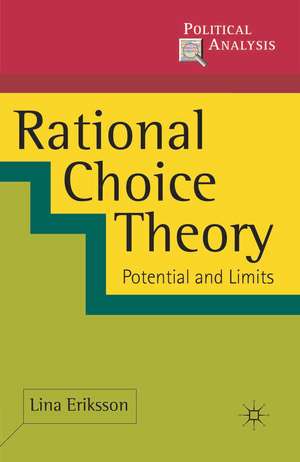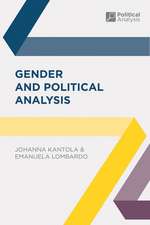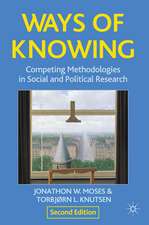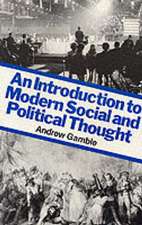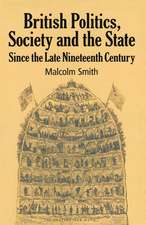Rational Choice Theory: Potential and Limits: Political Analysis
Autor Lina Erikssonen Limba Engleză Paperback – 17 oct 2011
| Toate formatele și edițiile | Preț | Express |
|---|---|---|
| Paperback (1) | 297.76 lei 6-8 săpt. | |
| Bloomsbury Publishing – 17 oct 2011 | 297.76 lei 6-8 săpt. | |
| Hardback (1) | 830.78 lei 6-8 săpt. | |
| Bloomsbury Publishing – 17 oct 2011 | 830.78 lei 6-8 săpt. |
Din seria Political Analysis
- 13%
 Preț: 300.90 lei
Preț: 300.90 lei -
 Preț: 262.54 lei
Preț: 262.54 lei - 12%
 Preț: 256.06 lei
Preț: 256.06 lei -
 Preț: 294.02 lei
Preț: 294.02 lei - 14%
 Preț: 198.30 lei
Preț: 198.30 lei - 14%
 Preț: 301.09 lei
Preț: 301.09 lei - 17%
 Preț: 273.42 lei
Preț: 273.42 lei - 22%
 Preț: 269.76 lei
Preț: 269.76 lei -
 Preț: 299.01 lei
Preț: 299.01 lei - 7%
 Preț: 300.62 lei
Preț: 300.62 lei -
 Preț: 229.32 lei
Preț: 229.32 lei - 17%
 Preț: 303.92 lei
Preț: 303.92 lei -
 Preț: 270.49 lei
Preț: 270.49 lei - 14%
 Preț: 835.93 lei
Preț: 835.93 lei - 13%
 Preț: 299.19 lei
Preț: 299.19 lei - 12%
 Preț: 298.52 lei
Preț: 298.52 lei - 14%
 Preț: 831.83 lei
Preț: 831.83 lei - 14%
 Preț: 298.25 lei
Preț: 298.25 lei - 14%
 Preț: 835.66 lei
Preț: 835.66 lei -
 Preț: 297.76 lei
Preț: 297.76 lei - 13%
 Preț: 407.74 lei
Preț: 407.74 lei - 19%
 Preț: 479.70 lei
Preț: 479.70 lei - 19%
 Preț: 479.85 lei
Preț: 479.85 lei
Preț: 297.76 lei
Nou
Puncte Express: 447
Preț estimativ în valută:
56.98€ • 60.93$ • 47.51£
56.98€ • 60.93$ • 47.51£
Carte tipărită la comandă
Livrare economică 17 aprilie-01 mai
Preluare comenzi: 021 569.72.76
Specificații
ISBN-13: 9780230545090
ISBN-10: 0230545092
Pagini: 296
Ilustrații: 1 figures
Dimensiuni: 155 x 235 x 17 mm
Greutate: 0.34 kg
Ediția:2011
Editura: Bloomsbury Publishing
Colecția Red Globe Press
Seria Political Analysis
Locul publicării:London, United Kingdom
ISBN-10: 0230545092
Pagini: 296
Ilustrații: 1 figures
Dimensiuni: 155 x 235 x 17 mm
Greutate: 0.34 kg
Ediția:2011
Editura: Bloomsbury Publishing
Colecția Red Globe Press
Seria Political Analysis
Locul publicării:London, United Kingdom
Notă biografică
LINA ERIKSSON Lecturer in Philosophy at Flinders University, Australia.
Cuprins
Introduction What is Rational Choice Theory? The Self-Interest Assumption Culture, Identity and Symbols Individuals and Institutions The Use and Misuse of Models Equilibrium The Micro-Level Mechanism Conclusion.
